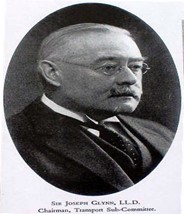PSFS History
PSFS History
The Public Service Friendly Society was formerly known as the Civil Service Benevolent Fund (CSBF) and was founded back in 1927. It was one of the first of its kind and was the model upon which the UK Civil Service built its own Benevolent fund. Friendly societies were at that time a very important part of social life in Ireland with the principle being defined as “a number of people entering into a mutual compact to help one another in case any disaster or distress fell upon them” (Defoe)*.
The Full history of the Society can be found in the document “A Servant to the Service” – Download here

PSFS First Meeting
The rules and regulations drawn up by the Draft Committee were approved at the first meeting of the CSBF held on 10 May 1927 with Taoiseach W.T. Cosgrove as President of its Executive Council, and the first chairman appointed, Sir Joseph A. Glynn LL.D.
Under the rules of the Fund, “assistance was available to civil servants and their widows and orphans to relieve distress, to provide access to specialist medical treatment and to provide for the costs of institutional care such as were provided in an orphanage or a sanatorium”.
In the years of high unemployment from the 1940’s to the 1960’s, it may have appeared to many that civil servants were lucky to have secure positions, but spiralling inflation and the refusal of successive governments to increase civil service salaries and pensions in line with rising costs of living saw great hardship to both serving and retired civil servants. Many relied on the Benevolent Fund for assistance during these years, particularly with the high incidence of tuberculosis. Membership of the Fund hovered around 6,000 up to the 1970’s despite a huge increase in the civil service numbers from 26,775 (1940) to 57,251 (1975). Owing to the sensitive and confidential nature of the work of the Fund, it was difficult to encourage new, young civil servants to join. The Fund was supported by fundraising events and donations.

Changes Through The Years
In 1965, the CSBF was forced to rethink its objectives and widened its remit to allow grants to any group of Civil Servants’ and/or retired Civil Servants undertaking social work for retired Civil Servants. As time moved on and with statutory widows and orphans scheme in place and free secondary education available, it was thought the demands on the Fund’s resources would decline. However, widows and orphans continued to receive the largest portion of the Fund’s resources with cases involving mental stress making increased demands on the Fund. The volume of grant increased significantly in the late 1970’s and early 1980’s. Monies distributed grew from an average of £10,000 per annum in the early 1970’s to a staggering £141,090 by 1985.
The early 1980’s saw a time of high interest rates and claims related to financial difficulties with many members becoming involved with moneylenders. It was obvious by the early 1990’s that social and economic pressures were impacting on civil servants under the age or 40, who comprised half of the Fund’s claimants.
By the early 1990’s it was obvious to many that the structures and operations of the Benevolent Fund needed to change to address the changes in society over the years. In 1993, the Society changed to its current name and incorporated a number of significant changes which reflected the way in which its member’s needs differed from those of 1927. It also gave the society the opportunity to relaunch its self and get away from the concept of it just being a benevolent fund.

Pat Fitzgerald
The development of the Society was directed by Pat Fitzgerald, its first full time employee and extended its membership to the entire public service, to include civil servants who had been transferred into semi-state bodies. Assistance to members evolved to those reflective of society to assist in managing their income and often restructuring their debt. This reflected the change in objectives of the Society from grants/donations in times of need to the management of underlying problems and the development of long-term solutions.
Further modifications were introduced in 2003 to guarantee transparency and accountability. The older structure of a large council and defunct Branch Committees was replaced by a smaller Committee of Management, elected at A.G.M. The role of Chairman was altered and a new post of Executive Director was established.

Declan O’Brien
Declan O’Brien was appointed the PSFS’s first Executive Director in March 2003. An additional full time post of Development officer was established in 1999 and a full time administrative assistant was seconded. All staff are seconded from Government Departments and are independent of the Committee, but are answerable to it. Since 2003, the membership of the PSFS has increased from 7,212 to now over 10,000 members in 2022.
Financial difficulties remain the main issue assist members, with relief of family problems, health difficulties, debt issues, hardship caused by bereavement including assistance with funeral expenses and help towards education making up the remaining applications. Although the nature of economic hardship has evolved since 1927, the PSFS has continued to support its members through the years, changing to reflect the needs of its members, with the aims and ethos essentially the same.
The Society is fully regulated and is accountable to the Registrar of Friendly Societies and has been granted charitable status by the Charities Regulatory Authority.
